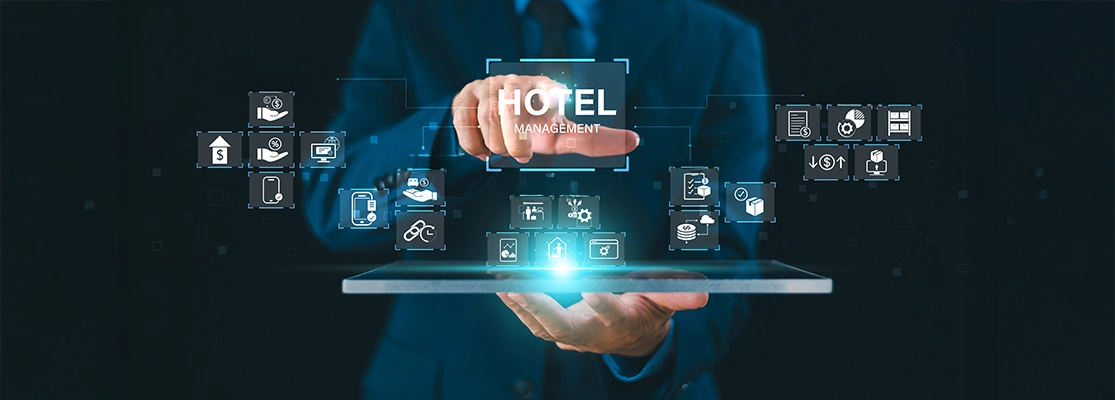The New Reality of Travel
A few years ago, business and leisure travel were seen as separate categories. Today, they’re blending—and this change isn’t temporary.
With remote work and travel becoming the norm, professionals are no longer bound to offices or rigid schedules. They’re combining work and leisure into one trip—coining the term “bleisure”. And for hotels, this is not just a shift in guest behavior. It’s a strategic opportunity.
This blog is a call to action for hotels: tap into the growing ‘work from anywhere’ culture by embracing bleisure travel as a powerful revenue opportunity—one that can boost occupancy, increase F&B sales, and build long-term brand loyalty. And the key to doing that lies in understanding guest behavior and using tech smartly. Tech helps us understand bleisure travel trends and how to be prepared for them.
Bleisure Isn’t a Trend. It’s a New Customer Segment.
In a post-pandemic world, remote workers, freelancers, and hybrid professionals are looking for flexibility—and hotels are in a perfect position to provide it.
Some points to consider:
- Many professionals extend business trips to stay an extra day or two.
- Others book a stay over the weekend and work from the hotel on Monday.
- Some even choose hotels during the week to avoid traffic or disruptions at home.
They’re spending more nights, making in-room dining orders across the day, and using hotel Wi-Fi and workspaces for productive hours. Hybrid travel experiences aren’t occasional. It’s intentional travel behavior, and the hotels that recognize and respond to it will stand out in a crowded market.
Leverage Technology for Enhanced Experiences
To attract and retain bleisure travelers, hotels must transition from merely offering basic amenities to providing a balanced environment that supports both work and rest. Tech solutions for hospitality play a vital role here.
1. Use Data to Understand Guest Intent
Pull insights from your PMS, channel manager, or booking engine:
- Length of stay can signal work + leisure intent.
- Analyze Wi-Fi usage to see working hours or repeat logins across devices.
- Monitor in-room dining trends—guests ordering lunch, tea, and dinner without stepping out may be remote workers.
These data points help identify patterns and design targeted offers.
2. Offer Work-Ready Rooms
Not every room should be the same. Consider:
- Rooms with comfortable desks, ergonomic chairs, good lighting, and charging ports.
- Prioritize these rooms for guests staying 3+ nights or checking in during weekdays.
You can also allow guests to choose a “Workation Room” when booking—making the experience feel intentional and personal.
3. Create Workspaces That Work
If your meeting or conference rooms are underused, repurpose them:
- On-demand co-working zones
- Private booths with plug-and-play options
- “Work from Hotel” day passes for locals or in-stay guests
Think of your property as a part-time workspace with full-time hospitality.
Create Engaging Bleisure Packages and Experiences
Bleisure isn’t just about fast Wi-Fi—it’s about a lifestyle. Hotels can design packages that support both productivity and relaxation. Understanding the data from tech can help you figure out how to improve your guest experiences and make them loyal customers.
Examples:
- Stay + Dine + Work: Pay for the room and get a work desk and daily meal credits.
- Mid-week retreat: 2 nights stay + workspace + yoga + late checkout
- Extend Your Stay: Book 3 nights, get 4th at 50% off if you work from the hotel on a weekday
These offers can fill rooms during lean periods and encourage guests to spend more time and money on-property.
It’s Not Just Tech—It’s the Ecosystem
Tech alone isn’t enough. You need an ecosystem that supports the bleisure mindset:
- Offer custom food plans—flexible hours, healthy menus, combo meals.
- Let guests book massage appointments or local experiences from your app or concierge.
- Enable mobile check-ins, contactless payments, and digital keys.
Bleisure guests want ease, comfort, and choice. Every touchpoint should reflect that.
What Hotel Management Needs to Rethink
The opportunity is strategic. Here’s how hotel leaders should look at it while exploring AI in hotel guest services:
- Reframe occupancy: Think in terms of purpose and intent—not just dates.
- Upsell differently: Instead of just F&B, upsell workspace access, day extensions, or local experiences.
- Adjust operations: Shift staff and kitchen hours to match flexible guest patterns.
- Build loyalty: Offer returning bleisure guests personalized packages and room preferences.
Hotels can also integrate platforms like CI Global’s RubiCube to draw insights across systems and plan smarter.
From Guest Rooms to Growth Engines
Hotels have long sold beds, meals, and convenience. Now, you can sell balance, lifestyle, and seamless work-leisure experiences.
Whether it’s a guest escaping city noise for a day of deep work, or a consultant extending a stay to unwind—the need is there. What’s missing is intentional design and targeted marketing.
Bleisure is not a trend. It’s a shift in how people live, work, and travel. The question isn’t whether your hotel should respond—it’s how fast you can build the right ecosystem.
Key Takeaways for Hotel Leaders
- Bleisure travel is here to stay—plan for it, don’t just react to it.
- Use data from bookings, Wi-Fi, and room service to understand guest intent.
- Create targeted work+stay packages to boost weekday occupancy and F&B sales.
- Invest in flexible workspaces and tech-driven guest experiences.
- Reimagine hotel operations around this new guest profile.
Speak to us to explore how insight-driven decisions can boost your brand, your bookings, and your guest experience. Let’s crack bleisure travel trends together.
